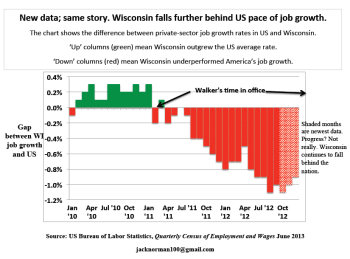Why We Trail America in Jobs Growth
In 21 of the last 23 months we have trailed the nation. Walker’s policies get much of the blame.
The newest jobs numbers are not the good news for Wisconsin some would have us believe. Yes, Wisconsin dropped from 44th worst in job growth to 33rd worst.
But what that “good news” means is that we’re not falling behind the nation quite as rapidly as we once were. Wisconsin is still missing out on the national recovery. And our governor’s policies are largely to blame.
Look at the chart that goes with this article. It shows, on a monthly basis, the gap between the rate of job growth in Wisconsin and in the nation. The downward columns, in red, are bad because they mean Wisconsin fell behind the national recovery.
At the far right, three shaded lines show the newest quarterly jobs data from the US Bureau of Labor Statistics. In the last quarter of 2012 (the newest data), Wisconsin gained nearly 2,000 jobs, an increase of about 0.1 percent. But nationally, the jobs growth rate was 0.8 percent, or eight times higher than in Wisconsin.
Since Scott Walker took office, Wisconsin has been growing jobs at little more than half the national average: jobs in this state have grown about 1.0 percent a year, compared to 1.7 percent per year nationally. If we’d have matched America’s pace, there’d be about 40,000 more employed Wisconsinites.
As the chart also shows, before Walker took office Wisconsin was growing at or slightly above the national rate. Since his inauguration, we’ve fallen well behind. The new numbers show we’re still falling behind, just at a slightly slower rate.
Sports-analogy alert: At the end of the first quarter in a football game you trail by seven points, a touchdown. At the end of quarter two you trail by 14 points, two touchdowns. In the third quarter you give up only a field goal, so you trail by 17 points. Are you cheering because you only fell behind by three more points instead of seven?
The facts are clear: during Walker’s time in office, Wisconsin has missed out on much of the national economic recovery. But is this the governor’s fault? How could he have so much impact? Couldn’t it be coincidence?
First, it’s worth noting that many decisions of the past, by Democrats as well as Republicans and private sector leaders, could contribute to the state’s lagging economy. But here are three examples of how Walker’s policies have thwarted jobs recovery.
Two: the public sector jobs that aren’t. In Walker’s first year in office, 15,500 jobs in state and local government were lost due to his cutbacks. It was the second-largest reduction in public sector jobs in the US in 2011, in percentage terms, according to Bureau of Labor Statistics data.
Three: the billion-dollar pay cuts. Public sector workers who kept their jobs lost about eight percent of their take-home pay. These are middle class workers who were previously spending this money at restaurants, grocery and hardware stores, dentists and local contractors. That’s nearly a billion dollars a year in lost spending that would have been circulating through the state economy.
From a macroeconomics point of view, all three mechanisms are job killers. You may like Walker’s ideology. But you should also accept the fact that implementing it has come with a very heavy cost.
Walker’s defenders have one last argument: There was no alternative open to him, other than raising taxes. Well, he should have raised taxes some on those who prospered the most over the past decade. It’s what Congress did for the nation, and that hasn’t harmed America’s economy.
Wisconsin needed a stimulus. The governor fed us a sedative instead.




















Jack, you are so right on! One of the tragedies or maybe shortsighted arguments of the Right is that it makes government spending except spending on Pentagon budgets, sound like money which is tossed out the window on the wind and ignore the job creation of such. Pentagon spending cuts almost always, always are screamed about as job killers and they are but so are other public sector cuts. AND salaries earned from state and local governments, services purchased by them as well as goods contracted for – all enhance the local and national economy. What we should be discussing is priorities and unfortunately we are currently in a time when the discussion has been overwhelmingly dominated by those who see government as bad (except the Pentagon). Keep up the good work!
Nonsense. You can’t compare Wisconsin to the rate of growth in States that have completely different economies and different population trends. That’s comparing apples to oranges, and it is deceptive Jack. Try comparing Walker’s Wisconsin to Doyle’s Wisconsin. I doubt we’ll see an article about that from a liberal though. Three other items:
1. The “job creation” from the train would have been short lived and artificial. Eventually that train would have been a yearly expense on our state and local governments and the result would be negative. It is utterly short sighted to think that several hundred jobs for a few years is worth millions of dollars in expenses in the long-run.
2. Creating (or saving) more public sector jobs is not the solution to job growth. We saw in the recall election the inflated salaries and benefits most public sector employees receive. That is a drain on the private sector tax payer and hurts private sector job growth. You claim “15,500 jobs in state and local government were lost due to [Walker] cutbacks,” but you fail to mention the savings that creates for our economy and Government budgets. Once again, this represents the liberal thinking of Government being able to create jobs out of thin air by increasing the public sector rolls. Government doesn’t create jobs, private businesses do. Government needs to get out of the way, and by slashing its spending (15,500 jobs is about a $620 million annual spending savings), it opens the door for real job growth.
3. The “billion dollar paycut” was essential to balance the budget of both the State and local governments and school boards. It also allowed for tax cuts to the taxpayers. The argument that that money didn’t end up back in the economy is nonsense. It simply was not redistributed as most liberals would prefer (i.e. through handsome benefits and pay to public sector employees). Instead, taxpayers keep more of their own hard earned money.
Your entire article is unfortunate and misleading. Good thing Wisconsinites are done falling for it and have elected Governor Walker twice (and counting). Keep up the good work Jack, you are making it more obvious how wrong liberals are about job creation.
Re: Andy
1. The “job creation” from the train would have been short lived and artificial. Eventually that train would have been a yearly expense on our state and local governments and the result would be negative.
Response: You have no evidence of this. It is an opinion.
2. You claim “15,500 jobs in state and local government were lost due to [Walker] cutbacks,” but you fail to mention the savings that creates for our economy and Government budgets.
Response: The savings come from a loss of jobs. That is not an opinion, it is a fact.
2. Government doesn’t create jobs, private businesses do.
Response: That is not a fact. The government employs people. Whether or not you like that fact is up to you, it’s your opinion. However, the government creates jobs when it hires people just like businesses create jobs when they hire people.
3. The “billion dollar paycut” was essential to balance the budget of both the State and local governments and school boards.
Response: That is not a fact. The budget could have been balanced in a wide variety of ways. I will let you discuss what is unfortunate and misleading about your opinions.
Anybody remember when this site was cool? Now its nothing more than partisan, nonsense articles like this. There is nothing special about this website. Urbanity? Just like MTV is supposedly about music.
By the way, Scott Walker isn’t responsible for slow job growth. An individual politician only has so much power. Cutting off that useless train wasn’t the problem. This has been an issue in Wisconsin for years before Walker.
First off D, doesn’t it stand to reason when the rest of the country is moving ahead Wisconsin is not, something wrong is happening here?
Jack, you missed a fourth factor. Walker has been working hard to shred the social safety net. As you know, a dollar spent on public assistance comes back as a roughly $1.75 effect on the economy.
Doyle fought to minimize attacks on the safety net. Though not totally successful, he did prevent the wholesale ripping the GOP wanted. That’s why on the eve of the Walker budget, Wisconsin was 11th in job growth. Ever since Walker’s policies went into effect, we have been in the basement.
Jack, your #3 point (a $1b paycut) is simply not a factor in Wisconsin’s economy.
Two reasons. First, the Wisconsin State Budget increased by $2b in the budget that just ended (and another $2b in the new budget.) While public employees received a paycut, there were areas of the budget that received more. The net effect of the budget was an increase in spending, true, by different people and sectors of the government.
Second, even if you don’t accept my first point, Wisconsin’s GDP is about $270b per year. A $1b paycut (over two years) is .18% of the economy. That’s a fart in the wind.
Let me tell you, the Republicans in small-town central Illinois are not at all like their Wisonsin counterparts. I visit central Illinois frequently, and there is considerable excitement about the leg of the high speed train network that will link Chicago with St. Louis. I’ve had people thank me, as a Wisconsinite, for the extra money that came their way when our state turned down money to join the Midwest network of high-speed rail. Residential dealready starting along the rou
Actually what I’d love to send them are Sykes and Belling who, for purely ideological reasons, have stirred up their minions against rail.
Heavy manufacturing in the state and country have been in an off-shoring mode for decades that expanded with Reagan policies of the 1980s and has continued though today. These same companies still want to sell products within the US when wages have remained essentially stagnant since a peak purchasing power of 1968-69. These large corporations have gotten all the tax breaks since the 80s and used these funds to expand business overseas, not here. All current job creation takes place in the small business sector.
As covered in the article, Walker’s policies slashed the pay of public workers that also spend in the Wisconsin market place. Make no mistake, this was a pay-cut and nothing else. It removed purchasing power in the market place. Small businesses felt the brunt of it as well as the families that have had to endure this theft of their hard won wage agreements.
Energy prices will continue to climb with time and world demand that sets these prices. Alternative efficient transportation systems will be needed now and expanded in the future. This includes needed investments in energy efficiency in all areas and renewable energy as in state sources to slow the flow of dollars outside the state. By 2030, Saudi Arabia will need all of their own oil production for domestic requirements of a growing population.
Walker’s policies are divisive, hate-filled, ill-informed, and based on ALEC written corporate supported model laws. The lawmakers and Walker are nothing but fascists and tools of large corporations. We have the least educated Republican law makers holding office in modern history. They cannot be trusted to make informed decisions based on factual information and analysis so they take their lead from Walker and their benefactors that do not have the interests of the citizens or the state, only their own selfish profit.
Republicans can tell people all they want that the policies and laws are honey on a stick. That is not honey, but bull crap.
Andy,
Your suggestion of comparing the record under Walker versus Doyle is an interesting one. The US unemployment rate peaked in October 2009, so that is my starting point. In that month the US rate was 10% and Wisconsin 9.1%. In January 2011, the US rate had dropped to 9.1% and Wisconsin to 7.7%, so the US rate had dropped by .9% compared to 1.4% for Wisconsin. The latest figures (for May and subject to revision) show 7.6% for the US and 7.0% for Wisconsin. This means that the rate for the US dropped 1.5% compared to .7% in Wisconsin.
A calculation of the jobs gained during this same period also favors Doyle over Walker (which I can share if you are interested). The bottom line is that annual gain for Doyle and the US is virtually the same (.89% vs .91%). In the Walker period the US gained about 2% per year compared to .76% for Wisconsin.
Just the other day I made the same argument at a much smaller scale on my blog.
http://manitowocmegaphone.blogspot.com/2013/07/paul-titts-little-shop-of-horrors.html
Duncan,
The question you raise, whether the three points Jack raises are sufficient explain Wisconsin’s weak job growth since Walker’s election (or a material part of it) is one that has concerned me as well. Here is one way of looking at it:
The latest jobs report (for May) shows Wisconsin with 2.794 million jobs. If our jobs had grown at the same rate as the nation since January of 2011, we would have 2.874 million, a difference of 79 thousand. If these lost jobs paid an average of $40,000 per year, as a first-order approximation we are talking of a loss to the economy of about $3.2 billion per year. The question, then, is whether costing out Jack’s three point would lead to a total somewhere around $3.2 billion.
For example, I understand that the train was scheduled to be running last month, so that turning down the grant would reduce that state’s economy by around half a billion per year over the last two years.
Two car manufacturing locations in Janesville and Kenosha were shut down permanently. At least three or more paper mills were shuttered. These are permanent losses of higher paying manufacturing jobs that have not been replaced by other positions. They supported at least two times their number in service related jobs. I have never seen a newspaper with an analysis report report on this type of topic and the impact. Since the crash, I do not believe there has been an in depth report on what we should be doing. Many experts know that trickle down and austerity by Walker policies do not work at providing a positive platform for growth. They cause the opposite, a contraction.
David,
You make a good point that we lack a serious analysis of why the Wisconsin economy has underperformed the national economy in the last two and a half years. Was it because Wisconsin was at the losing end of national trends (like closing auto plants and paper mills) or because of decisions made in Madison? Unfortunately serious analysis has been overwhelmed by increasing polarization. So it gets hard to learn from the experience.
Bruce